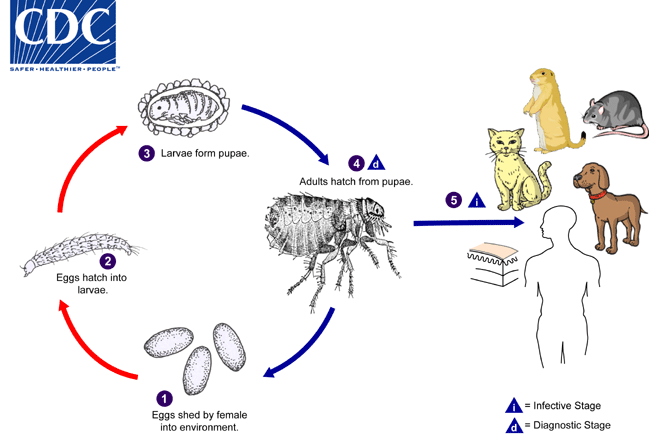Fleas: Nature’s Freeloaders
How Fleas Harm Pets
First off, fleas are nasty little parasites that literally suck the blood out of your pet. In fact, heavy infestations can result in serious, life-threatening anemia from all that blood loss, particularly in young animals.
Many pets are not just irritated by flea bites, but highly allergic to them. Such animals can experience extreme hairloss, itching, and nasty skin lesions from even a single flea bite. My own dog falls into that category, and it’s one of the many reasons we keep him on flea prevention year-round. No reason to risk a stray flea turning him into a miserable mess!
Fleas can also carry diseases. One of the most common is the tapeworm Diplydium caninum. Nothing gets an owner in the clinic faster than a dog or cat with a wriggling worm on its bottom. Plus, people can get this tapeworm, too. Fleas may also infect cats with serious bacterial diseases.

Life & Times
To really handle a flea infestation you need to understand a few things about their life cycle. Once a female flea finds your pet they will start laying eggs within 48 hours – up to 40 of them per day, per flea. Those eggs fall off the animal into the environment to hatch, meaning that by the time you recognize your pet has fleas your house and yard are likely packed with eggs. It takes around a month for those eggs to develop into adults capable of hitching a ride (and a blood meal) on your pet.
All this leads to several important points:
- First, cleaning the environment to get rid of as many eggs as possible is vital. Launder bedding and vacuum thoroughly. Flea larvae like dark, warm, humid spots, so focus on those.
- Pets with fleas should be treated for at least three months. You’re extremely unlikely to get all the eggs and larvae in the environment, and a couple of fleas can start the process all over they mature.
- Flea infestations happen FAST. Adults hunt for a host aggressively, breed quickly and prolifically, meaning one dog with fleas getting walked around the neighborhood can easily result in your pet finding some new friends.
Getting Rid of Fleas
Fortunately, there are several safe products available to treat and prevent flea infestations. As noted above, any pet that catches fleas should be treated for at least three months, as by the time you notice the fleas eggs are almost certainly scattered throughout your home. ALL pets will need to be treated, too – while the dog may have brought the fleas in, the cat will provide them food and shelter if he’s not treated too.
Last but not least – prevention is worth more than cure. Southern Indiana is a flea paradise, and it’s less a question of if your pet will be exposed, but when and how often. We see them regularly even in the dead of winter. So, the best move is to just keep them on a good preventative year round. We carry a variety of products to fit your pet’s lifestyle and your budget – don’t hesitate to call or stop by for help!
